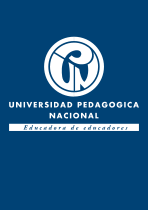Currículo oculto en la investigación formativa del Programa de Licenciatura en Educación Física.

Citación
Fecha
2018-12-05Autor
Paz Benavides, Juan David
Enlace al recurso
https://revistas.pedagogica.edu.co/index.php/LP/article/view/9425Palabras claves
Actitudes investigativas
Competencias investigativas
Currículo
Investigación formativa
Keyword
CurriculumResearch attitudes
Research competences
Formative research
Atitudes investigativas
Competências investigativas
Currículo
Pesquisa formativa
Metadatos
Mostrar el registro completo del ítemResumen
Este artículo de investigación pretende interpretar cómo influye el currículo oculto en la investigación forma-tiva desarrollada en el Programa de Licenciatura en Educación Física de la Institución Universitaria Cesmag y la percepción que la comunidad académica tiene sobre él. Los resultados muestran que el currículo oculto construye actitudes, habilidades y competencias investigativas en los estudiantes, producto de la interacción con sus pares estudiantiles y docentes. Asimismo, se resalta la importancia de la experiencia investigativa en docentes que orientan, asesoran y evalúan los procesos investigativos desarrollados por los estudiantes del programa. También se evidencia que las actitudes conductuales negativas de los docentes son producto de una baja producción investigativa, y que de manera inconsciente se transmiten al estudiantado y generan relaciones académicas negativas, lo cual dificulta la construcción de competencias específicas de este campo.
Abstract
Formative research is a strategy which allows linking the professional practice and the knowledge constructed in each of the subjects to propose solutions to problems identified in their pedagogical work. It is explicit in the curriculum of educational centers; however, the hidden curriculum plays a very important role in the construction of attitudes, skills and investigative competences. This article attempts to interpret how the hidden curriculum influences the formative research of the Bachelor's Degree in Physical Education of the Institución Universitaria Cesmag, and the perception that the academic community has about it. The results show that the hidden curriculum builds attitudes, skills and research competences in students, as a result of their interaction with their peers and teachers. Likewise, they highlight the importance of the research experience in teachers who guide, assess and evaluate the research processes developed by the students of the program. It is also evident that the teachers’ negative behavioral attitudes are the product of a low research production. They are unconsciously transmitted to students and generate negative academic relationships, which makes the construction of specific competences in this field difficult.
Editorial
Editorial Universidad Pedagógica Nacional
Fuente
Colecciones
- Lúdica Pedagógica [417]
